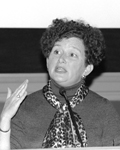The University Record, December 20, 1999 By Theresa Maddix

Provost Nancy Cantor noted many newly-implemented “family-friendly” policies and projects from the past year in the “Dialogue with Provost Nancy Cantor” Dec. 14 at Rackham Amphitheater. Her talk was sponsored by the Commission for Women and the Women of Color Task Force. A brief question-and-answer session followed Cantor’s remarks.
Cantor’s first example of “concrete progress” was the doubling—from three to six—of sick days that eligible employees can use for dependent care. Cantor said her aim is for the U-M to reach a point where staff members can use all of their short-term sick days as dependent care days, if necessary. Before taking that step, her office first is monitoring the impact of the current increase.
Other highlights from the past year were in the changes to the Kids Care at Home program, which increased the number of hours employees can use its services from 24 hours to 36 hours per year. The program, headed by Leslie De Pietro, also expanded to the Flint and Dearborn campuses. Kids Care “has turned out to be a very challenging program to run but one which is extremely successful.”
Along with the Kids Care at Home program, De Pietro continues to run the Elder Care and the Child Care Referral programs through the Family Care Resource Program.

In process, too, are changes to the tuition reimbursement policy. The policy, which “hasn’t been looked at for some time,” is being examined by the University’s executive officers, deans and directors, with Cantor’s office. “My goal,” Cantor said, “is to change the tuition reimbursement program to a tuition advance program.” She spoke of increasing the “reimbursement ceiling for courses taken in other learning institutions from $600 to $800” and removing the limit of terms a staff member can receive reimbursements in any given year.
In the past year, the Provost’s Office also allocated a “$1 million lump-sum payment” to be spread across University units to reward staff members for “particular stresses from the past year” such as the M-Pathways transition.
The Lower Compensated Staff Salary Program also continued this year, providing increases above the merit increases for salary levels of $25,000 and less. Next year the Provost’s Office will take a close look at the program to ensure it has accomplished its objectives.
Cantor also noted this year’s change in employees’ benefits packages, allowing credit for prior service. Now staff members with a break of one year or more in their University employment can, after 10 continuous years back at the University, receive credit for the time they spent at the University before the break. This adds flexibility, Cantor said, for people taking a break for family or personal reasons.
In other positive news from the past year, Kathleen Donohoe was named director of the Sexual Harassment Policy Office. Cantor said Donohoe “wants to do a forward-looking educational program, so issues become less matters of litigation and grievance and more matters of understanding what it means to have a hospitable climate.”
During the question-and-answer session Cantor was asked about parking. “One of the things that is just amazing to me,” she said, “is how hard it is to solve some problems that everybody agrees are so critical to the daily flourishing of the University.
“They [Parking and Transportation Services] have just put on line 208 new Blue spots on Central Campus” but parking remains a problem both in accessibility—finding a spot—and affordability.
She noted that “parking is extremely expensive for the University,” with a cost of $1,500 a year to build and maintain a single spot on Central Campus. “One of the things we want to do is make alternative programs more usable.” Examples include the emergency taxi service and the bus system. Cantor said her office and the Parking and Transportation Services Office are “stepping up monitoring and enforcement” of existing spaces.
Responding to a comment about the ability to change classification ranks and job families within the University, Cantor encouraged staff to take Human Resource Development and Information Technology Division courses. She also sees part of the larger issue of professional development to be flex-time and said, “I want to say centrally we are urging people to allow as much flex-time as possible.”
At the close of the session, alumna and former University employee Bernadette Malinoski read a statement charging that, “the changes in organizational culture [at the University] have been more cosmetic than fundamental.” She said the University, “with rare and wonderful exceptions,” is “a workplace that deadens rather than enlivens the human spirit.”
“We see progress every day,” Cantor responded, “because, in fact, the spirit is far from dampened on campus in office after office. The list of things that I read, which you may view as cosmetic, I don’t view as cosmetic. Those things only happened because we are not dead people, not dead spirits.
“Are we perfect? Far from it. But there is a myriad of things that we are trying to address. What we are really good at is that we have enormous energy as an institution and for the most part it is used constructively.”
Cantor extended an invitation for further comments and questions from the University community to be sent via e-mail to [email protected].

